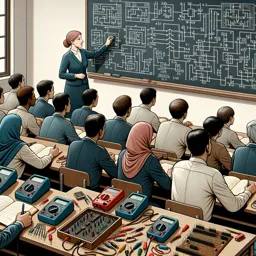
Free online courseEngineering Circuits Analysis
Duration of the online course: 3 hours and 11 minutes
Master circuit analysis with our free online course, covering voltage, current, resistance, Ohm's Law, Kirchhoff's Laws, and more. Ideal for aspiring electricians.
In this free course, learn about
- Fundamentals of Electrical Quantities and Components
- Power and Kirchhoff’s Fundamental Laws
- Applying Kirchhoff’s Laws to Circuit Analysis
- Advanced Use of Kirchhoff’s Laws and Power Relationships
- Dependent Sources and Further Kirchhoff Applications
- Series/Parallel Resistive Networks and Divider Circuits
- Voltage and Current Divider Applications
Course Description
The "Engineering Circuits Analysis" course offers an in-depth exploration of fundamental and advanced topics essential for professionals in the field of electrical engineering. This course is meticulously designed for those who are part of the Professional courses category and specifically caters to the subcategory of Electricians. With a total runtime of 3 hours and 11 minutes, this course ensures a thorough understanding of critical concepts without overwhelming the learners.
To commence the journey into circuit analysis, the course begins with an introductory lesson on Voltage, Current, and Resistance. These are the three pillars of electrical circuits, forming the foundation upon which more complex theories and applications are built. Understanding these basics is crucial for any aspiring electrician or engineer.
The second lesson provides a comprehensive overview of essential circuit components such as resistors, capacitors, inductors, transistors, diodes, and transformers. Knowing how each component functions and affects a circuit is imperative for analyzing and designing circuits effectively.
Next, the course delves into Ohm's Law, a fundamental principle in circuit analysis. This lesson demonstrates how to apply Ohm's Law to understand the relationships between voltage, current, and resistance within circuits, facilitating problem-solving and circuit design.
Following that, the Power Calculations in Circuits lesson introduces methods to calculate power consumption and generation in various circuit configurations. This is an essential skill for ensuring efficient and effective circuit design.
The course then dedicates a series of lessons to Kirchhoff's Laws, starting with Kirchhoff's Current Law and Kirchhoff's Voltage Law. Each law is explored in detail, beginning with theoretical underpinnings and progressing to practical applications. These laws are vital for analyzing complex circuits with multiple loops and nodes.
Subsequent lessons focus on in-depth circuit analysis using Kirchhoff's Laws. In these multi-part lessons, learners engage with real-world scenarios and extensive problem-solving exercises to solidify their understanding and application of these critical laws. This hands-on approach not only reinforces theoretical knowledge but also enhances practical skills.
Special attention is given to circuits with dependent current sources in two dedicated lessons, where specific strategies and methods for solving such circuits are taught. These lessons are crucial for dealing with advanced circuit configurations encountered in professional practice.
The course also covers the practical aspects of working with resistors in series and parallel configurations. Understanding these concepts is essential for simplifying and analyzing complex circuits accurately.
In addition, the course includes detailed lessons on voltage divider circuits and current divider circuits. These are common circuit configurations that are widely used in various applications, and mastering their analysis and design is crucial for any professional in the field.
"Engineering Circuits Analysis" provides a structured, detailed, and practical approach to mastering circuit analysis, making it an indispensable resource for anyone aiming to excel in electrical engineering and related fields.
Course content
- Video class: Lesson 1 - Voltage, Current, Resistance (Engineering Circuit Analysis) 41m
- Exercise: What is the purpose of a resistor in an electric circuit?
- Video class: 02 - Overview of Circuit Components - Resistor, Capacitor, Inductor, Transistor, Diode, Transformer 45m
- Exercise: Which of the following components is used to block electric current in one direction while allowing current to flow in the opposite direction?
- Video class: 03 - What is Ohm's Law in Circuit Analysis? 39m
- Exercise: Given a simple series circuit with a 12V battery source connected to two resistors, R1 and R2, in series where R1 has a resistance of 1 ohm, R2 has a resistance of 2 ohms, and a current of 4A is flowing through the circuit, what is the voltage drop across resistor R2?
- Video class: Lesson 4 - Power Calculations In Circuits (Engineering Circuit Analysis) 04m
- Exercise: What is the correct formula for calculating electrical power in a circuit element?
- Video class: Lesson 5 - Kirchhoff's Current Law (Engineering Circuit Analysis) 04m
- Exercise: What is Kirchhoff's current law (KCL) commonly used for in circuit analysis?
- Video class: Lesson 6 - Kirchhoff's Voltage Law (Engineering Circuit Analysis) 04m
- Exercise: According to Kirchhoff's Voltage Law (KVL), what is the sum of all the voltage drops around any closed path in a circuit?
- Video class: Lesson 7 - Circuit Analysis Using Kirchhoff's Laws, Part 1 (Engineering Circuit Analysis) 04m
- Exercise: According to the principles described in the circuit analysis section, which of the following statements is true when applying Kirchhoff's Current Law (KCL) and Kirchhoff's Voltage Law (KVL) to a series circuit with a 24-volt source and resistors of 2 ohms, 5 ohms, and 1 ohm?
- Video class: Lesson 8 - Circuit Analysis Using Kirchhoff's Laws, Part 2 (Engineering Circuit Analysis) 04m
- Exercise: Which of the following statements correctly applies Kirchhoff's laws to solve for unknowns in a circuit analysis problem?
- Video class: Lesson 9 - Circuit Analysis Using Kirchhoff's Laws, Part 3 (Engineering Circuit Analysis) 04m
- Exercise: In a complex circuit obeying Kirchhoff's laws, if the current entering a node is known to be 1A and the circuit consists of multiple branches and loops, which of the following statements is correct?
- Video class: Lesson 10 - Circuit Analysis Using Kirchhoff's Laws, Part 4 (Engineering Circuit Analysis) 04m
- Exercise: In circuit analysis, when using a current source as opposed to a voltage source, what does the current source guarantee?
- Video class: Lesson 11 - Circuit Analysis Using Kirchhoff's Laws, Part 5 (Engineering Circuit Analysis) 04m
- Exercise: According to Kirchhoff's Voltage Law, which of the following statements is correct for a closed circuit loop?
- Video class: Lesson 12 - Circuit Analysis Using Kirchhoff's Laws, Part 6 (Engineering Circuit Analysis) 04m
- Exercise: In the context of circuit analysis and specifically when applying Kirchhoff's laws to a circuit with multiple resistors, which of the following is not a valid method for calculating the power dissipated by a resistor?
- Video class: Lesson 13 - Circuit Analysis Using Kirchhoff's Laws, Part 7 (Engineering Circuit Analysis) 04m
- Exercise: In a given circuit analyzed by Kirchhoff's laws, if there's a known current of 4 amps flowing through a specific branch, which of the following statements could effectively utilize this information to find the unknown resistance R?
- Video class: Lesson 14 - Solving Circuits With Dependent Current Sources (Engineering Circuit Analysis) 04m
- Exercise: In the circuit analysis video, which component is described as having a current that is not a fixed number but rather dependent on another value in the circuit?
- Video class: Lesson 15 - Solving Circuits With Dependent Current Sources, Part 2 (Engineering Circuit Analysis) 04m
- Exercise: When using Kirchhoff's laws to analyze a circuit with dependent current sources, if V0 is given as 5 volts, which of the following should you calculate in order to proceed with solving for V1 and the source voltage?
- Video class: Lesson 16 - Resistors In Series And Parallel, Part 1 (Engineering Circuit Analysis) 04m
- Exercise: In circuit analysis, how does the current behave in a series resistor network?
- Video class: Lesson 17 - Resistors In Series And Parallel, Part 1 (Engineering Circuit Analysis) 04m
- Exercise: Considering a circuit with resistors in series and parallel combinations, if we have a resistor of 30 ohms in series with a parallel combination of a 60 ohm and a 20 ohm resistor, what is the equivalent resistance of the circuit looking in from terminals A to B?
- Video class: Lesson 18 - Voltage Divider Circuits, Part 1 (Engineering Circuit Analysis) 04m
- Exercise: What is the concept behind a voltage divider in a circuit?
- Video class: Lesson 19 - Voltage Divider Circuits, Part 2 (Engineering Circuit Analysis) 02m
- Exercise: In a circuit containing a voltage source and multiple known resistors arranged in a certain manner, when measuring the voltage across a gap between two resistors and another gap between two other resistors, what fundamental principle allows us to determine the potential difference?
- Video class: Lesson 20 - Current Divider Circuits (Engineering Circuit Analysis) 03m
- Exercise: In a current divider circuit with two parallel resistors R1 and R2, if the total current from the source is Is and it's known that the voltage across each resistor is the same because they are connected in parallel, which of the following expressions correctly relates the current (I1) flowing through resistor R1?
This free course includes:
3 hours and 11 minutes of online video course
Digital certificate of course completion (Free)
Exercises to train your knowledge
100% free, from content to certificate
Ready to get started?Download the app and get started today.
Install the app now
to access the courseOver 5,000 free courses
Programming, English, Digital Marketing and much more! Learn whatever you want, for free.
Study plan with AI
Our app's Artificial Intelligence can create a study schedule for the course you choose.
From zero to professional success
Improve your resume with our free Certificate and then use our Artificial Intelligence to find your dream job.
You can also use the QR Code or the links below.

More free courses at Electrician

Free CourseSiemens PLC Training

9h42m

32 exercises

Free CourseElectronic Circuits Course

43h25m

49 exercises

Free CourseElectronic Circuit Design Course

9h31m

51 exercises

Free CourseWind Turbines

3h49m

19 exercises

Free CourseElectricity course

31h41m

6 exercises

Free CourseElectronics - Nanoelectronics: Devices and Materials

40h15m

31 exercises

Free CourseElectrical - Fabrication of Silicon

35h10m

28 exercises

Free CourseElectrical engineering

11h53m

20 exercises

Free CourseBasic electronics

6h04m

30 exercises

Free CourseBeginner Electronics

5h27m

24 exercises

Free CourseSiemens PLC Training
9h42m
32 exercises

Free CourseElectronic Circuits Course
43h25m
49 exercises

Free CourseElectronic Circuit Design Course
9h31m
51 exercises

Free CourseWind Turbines
3h49m
19 exercises

Free CourseElectricity course
31h41m
6 exercises

Free CourseElectronics - Nanoelectronics: Devices and Materials
40h15m
31 exercises
Free CourseElectrical - Fabrication of Silicon
35h10m
28 exercises

Free CourseElectrical engineering
11h53m
20 exercises

Free CourseBasic electronics
6h04m
30 exercises

Free CourseBeginner Electronics
5h27m
24 exercises
Download the App now to have access to + 5000 free courses, exercises, certificates and lots of content without paying anything!
-
100% free online courses from start to finish
Thousands of online courses in video, ebooks and audiobooks.
-
More than 60 thousand free exercises
To test your knowledge during online courses
-
Valid free Digital Certificate with QR Code
Generated directly from your cell phone's photo gallery and sent to your email

Download our app via QR Code or the links below::.







